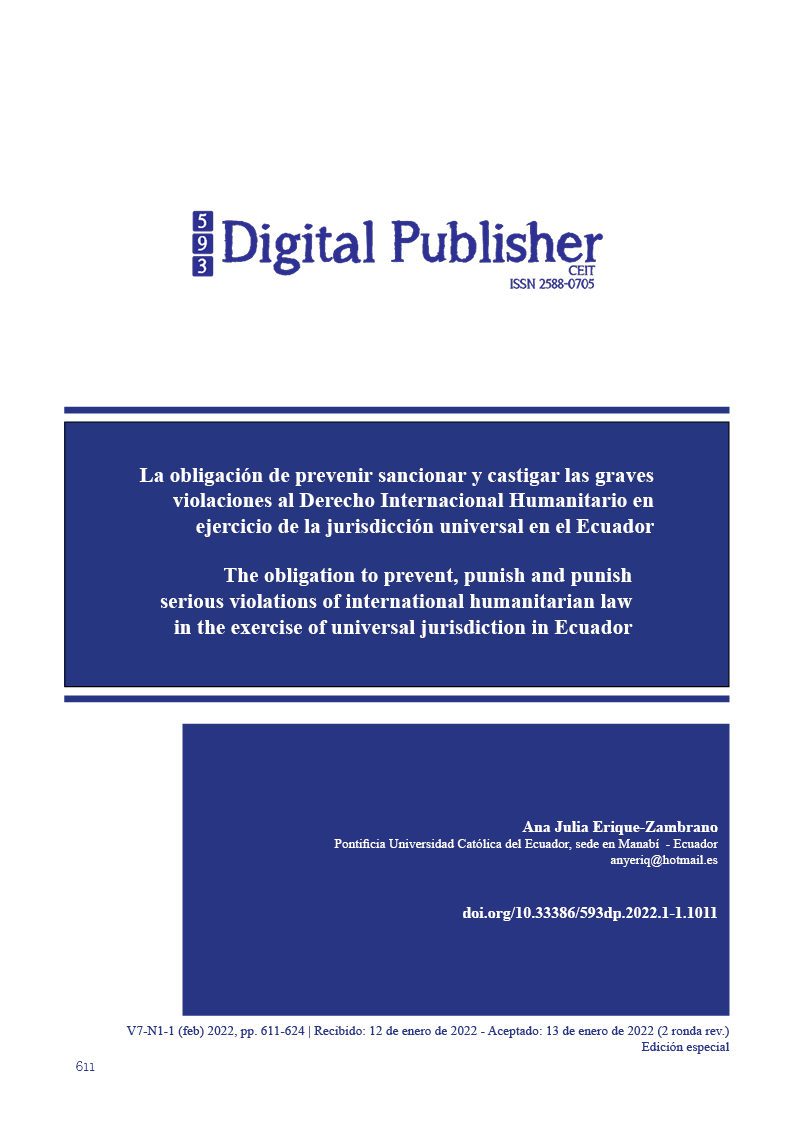The obligation to prevent, punish and punish serious violations of international humanitarian law in the exercise of universal jurisdiction in Ecuador
Main Article Content
Abstract
The present work formulates an analysis of the main milestones of the emergence and development of IHL, as well as the guarantees that Ecuador exercises in its application, covering all those laws with which this country works in order to validate these rights. For this, a descriptive study was carried out, through a documentary bibliographic review.
With what was obtained as a result that Ecuador to date has had significant progress on the implementation of IHL both in legislative terms through the COIP, where it is sanctioned with a custodial sentence of one (1) up to twenty-six (26) years. on the commission of war crimes, as well as institutional ones, in the sense that it recognizes the organizations that have an inter-agent functionality for the achievement of the objectives set by IHL.
In addition, through an analysis of comparative law with respect to the application of IHL in other countries such as Colombia, Bolivia, Panama and Venezuela, it was possible to determine the margin of competence that local courts have for the exercise of universal jurisdiction, which is a tool which seeks to guarantee the international obligation to prevent, punish and sanction violations of IHL.
Downloads
Article Details

This work is licensed under a Creative Commons Attribution-NonCommercial-ShareAlike 4.0 International License.
1. Derechos de autor
Las obras que se publican en 593 Digital Publisher CEIT están sujetas a los siguientes términos:
1.1. 593 Digital Publisher CEIT, conserva los derechos patrimoniales (copyright) de las obras publicadas, favorece y permite la reutilización de las mismas bajo la licencia Licencia Creative Commons 4.0 de Reconocimiento-NoComercial-CompartirIgual 4.0, por lo cual se pueden copiar, usar, difundir, transmitir y exponer públicamente, siempre que:
1.1.a. Se cite la autoría y fuente original de su publicación (revista, editorial, URL).
1.1.b. No se usen para fines comerciales u onerosos.
1.1.c. Se mencione la existencia y especificaciones de esta licencia de uso.
References
Abrisketa, J. (2018). Derechos humanos y acción humanitaria. Madrid, España: Alberdania S.L.
Arce, D. (2018). Petróleo y Derecho Internacinal Humanitario. Bogotá, Colombia: Servicio de Publicacicones de la Pontificia Universidad Javeriana.
Asamblea Nacional Constituyente. (2008). Constitución de la República del Ecuador. Montecristi, Ecuador: Registro Oficial 449 de 20 de octubre de 2008.
Asamblea Nacional del Ecuador. (2018). Código Orgánico Integral Penal, COIP. Quito, Ecuador: Registro Oficial 180 de 10 de febrero de 2014.
Cebada, A. (2012). ¿Qué es el Ius Cogens? / What is ius cogens? Obtenido de http://www.iuscogensinternacional.com/p/que-es-el-ius-cogens.html
Cherif, M. (2019). Jurisdicción universal para crímines internacionales: Perspectiva histórica y práctica contemporánea . Ilinois, Estados Unidos: Fondo Editorial de la Universidad DePaul.
Comité Internacional de la Cruz Roja (CICR). (2004). ¿Qué es el derecho internacional humanitario? Recuperado el 27 de noviembre de 2021, de Sitio Web del Comité Internacional de la Cruz Roja: https://www.icrc.org/es/doc/resources/documents/misc/5tdljk.htm
Comité Internacional de la Cruz Roja (CICR). (2017). Alcance y aplicación del principio de jurisdicción universal: declaración del CICR ante la ONU, 2017. Recuperado el 27 de noviembre de 2021, de Sitio Web del Comité Internacional de la Cruz Roja: https://www.icrc.org/es/document/alcance-y-aplicacion-del-principio-de-jurisdiccion-universal-declaracion-del-cicr-ante-la
Fernández, J. M. (2020). La corte penal internacional: Soberanía versus justicia universal. Buenos Aires, Argentina: Editorial Zavalía.
Freire, M. (2 de junio de 2021). Colombia y los DDHH y DIH. Obtenido de Blogspot.como: https://derechointernacionalhumanitario12.blogspot.com/p/colombia-y-los-ddhh-y-dih.html
Henckaerts, M. (2010). Desarrollo del derecho internacional humanitario y la continua pertinencia de la costumbre. 540-542.
Hernández, D. (2019). Derecho Internacional Humanitario: Cómo y por qué aplicar el derecho internacional humanitario a la legislación. Bogotá, Colombia: Ediciones Jurídicas.
López, A. G. (2013). Primera sentencia de la Corte Penal Internacional sobre reparación a las víctimas: Caso the prosecutor C. Thomas Lubanga Dyilo, 7 de agosto de 2012. Revista Española de Derecho Internacional, 115(2), 209-226. Recuperado el 27 de noviembre de 2021, de http://bibliotecaculturajuridica.com/biblioteca/arxius/PDF/REDI_VOL_LXV2_2013/07_Ana_Gemma_Lo__pez_Marti__n_digital.pdf
Martínez, A., & Vergara, M. M. (2017). La jurisdicción universal como instrumento para la protección de pueblos indígenas: Una guía práctica para defensores de derechos humanos. Copenhague, Dinamarca: Fundación Internacional Baltasar Garzón pro Derechos Humanos y Jurisdicción Universal.
Melzer, N. (2019). Derecho Internacional Humanitario: Una introducción integral. Recuperado el 30 de noviembre de 2021, de Sitio Web del Comité Internacional de la Cruz Roja: https://www.editorialjuris.com/administracion/frm-libros/pdf/1574945182_DIH-Introduccion-integral.pdf
Philippe, X. (2018). Los principios de jurisdicción universal y complementariedad: Su interconexión. Madrid, España: Servicio de Publicaciones de la Universidad Autónoma de Madrid.
Pino, E. E., Rojas, J. A., & Copa, D. C. (2021). La Jurisdicción Universal. Una novel figura en la legislación penal ecuatoriana. Dilemas Contemporáneos: Educación, Política y Valores(46), 1-16. Recuperado el 27 de noviembre de 2021, de http://www.scielo.org.mx/scielo.php?pid=S2007-78902021000600046&script=sci_arttext_plus&tlng=es
PROCUO abogados. (2020). Derecho Internacional Público: Concepto, Funcionamiento e Importancia. Obtenido de https://www.proquoabogados.com/derecho/internacional/publico/
Quijano, C., Ruiz, R., Roberts, C., & Guerrero, E. (2018). Implementación Del Derecho Internacional Humanitario En Ecuador. USFQ Law Review, 5(1), 262-285. Recuperado el 30 de noviembre de 2021, de https://revistas.usfq.edu.ec/index.php/lawreview/article/view/1227/1241
Ramella, P. (1899). Crímenes contra la humanidad. Buenos Aires: Ediciones Depalma. Obtenido de https://lawcat.berkeley.edu/record/331850
Rivera, V. (2012). TIPIFICAR LOS CRÍMENES DE GUERRA COMO DELITOS EN EL CÓDIGO PENAL BOLIVIANO EN EL MARCO DEL DERECHO INTERNACIONAL HUMANITARIO. Obtenido de https://repositorio.umsa.bo/bitstream/handle/123456789/14063/T3699.pdf?sequence=7&isAllowed=y#:~:text=Bolivia%20est%C3%A1%20obligada%20a%20reprimir
Salmón, E. (2004). INTRODUCCIÓN AL DERECHO INTERNACIONAL HUMANITARIO. Obtenido de https://www.corteidh.or.cr/tablas/r25212.pdf
Segura, A. (2019). El Derecho Internacional Humanitario y las operaciones de mantenimiento de la paz de las Naciones UNidas. Madrid, España: Plaza y Valdés S.L.
Unión Interparlamentaria, UIP & Comité Internacional de la Cruz Roja, CICR. (2018). Derecho Internacional Humanitario. Recuperado el 30 de noviembre de 2021, de Archivo Digital de la Unión Interparlamentaria: https://www.ipu.org/file/5060/download
Vargas, P. (2014). Los Conflictos Armados Internacionales y los Conflictos Armados no Internacionales y su Aplicación de las normas Universales del Derecho Internacional Humanitario. Obtenido de http://www.dspace.uce.edu.ec/bitstream/25000/3077/5/T-UCE-0013-Ab-13.pdf


